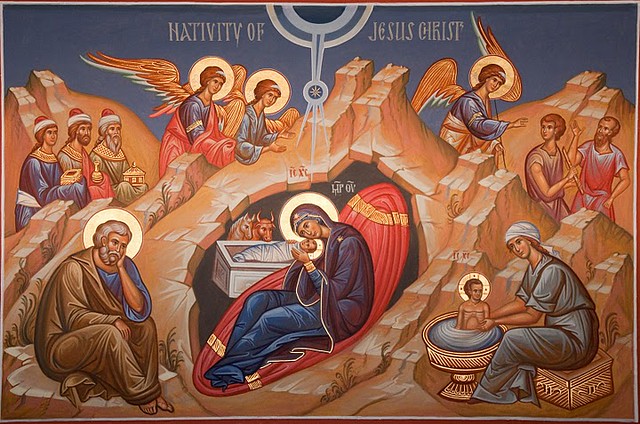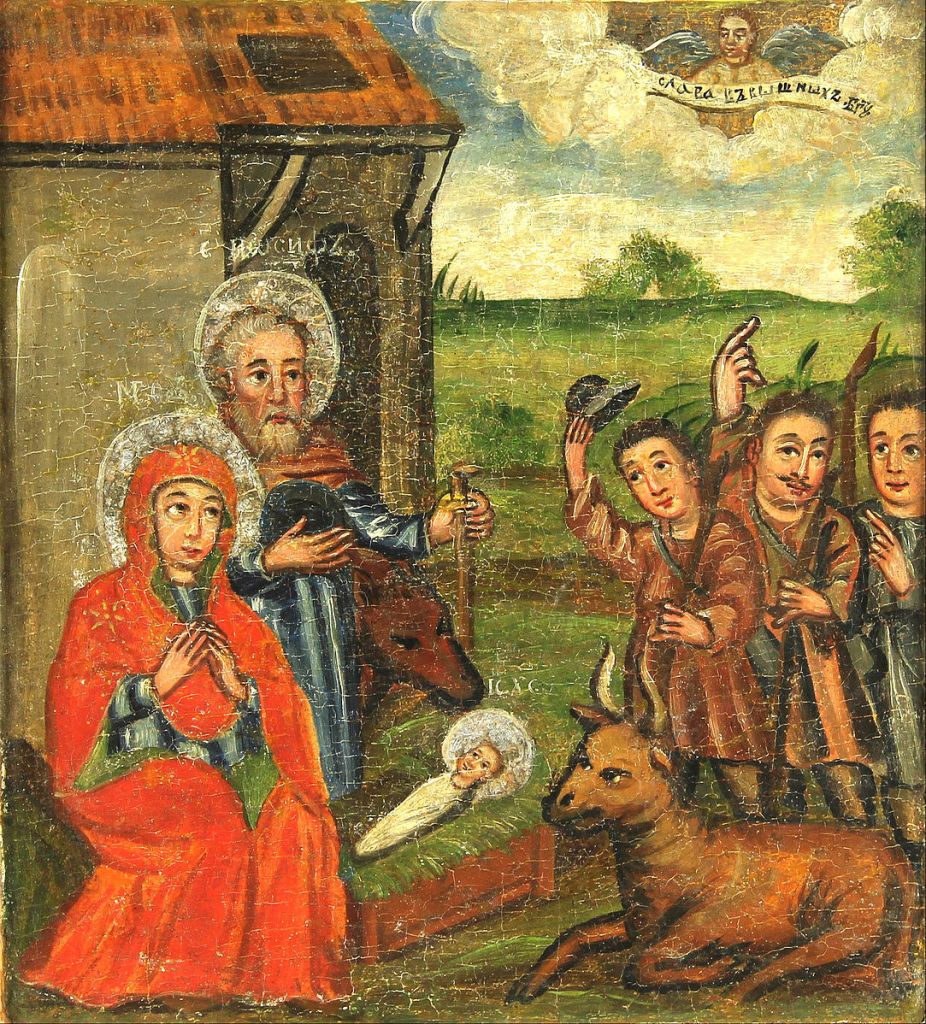I love Christmas. I love the story of the shepherds, the angels, and the Magi. Luke 2:1-20 was one of the first longer passages ever I had memorized. I love the hymns, both the ones I grew up with (which, given my Fundamentalist upbringing was one of the few times real theology actually crept into my life), and the ones I now sing as an Orthodox. I love being with family, the good cheer, the anticipation of the coming year, and the taking stock of the past year.

When I read myself into Calvinism as an undergraduate I gained an understanding of Christmas a bit different than the one I had grown up with, a skewed view that Jesus came to be the king of Israel, but once the Jews rejected him, his mission turned to the Gentiles. I was not really sure whether he would have faced the cross, but one branch of my upbringing actually thought he wouldn’t.
With Calvinism I’m not sure I was a lot better off: Christ comes to satisfy God’s wrath against my sin, to endure as a man God’s wrath, and to propitiate the divine justice. His life was for the keeping of the law Adam had failed to do, and his death erased the debt my sin and guilt owed. All rather tidy, wouldn’t you say?
But once I started reading Orthodoxy I came up against a completely different understanding. Yes, God was still a God of wrath, angered by my sin, and yes, Christ as the second Adam came to complete what Adam had failed to do, but the similarities largely ended there (if similarities they are).
What Christ accomplished by His Incarnation was nothing less than the conquering of death, and of him who through the power of death had kept us all in fear of death, as we read in one of the epistles appointed for the Royal Hours for this day.
In the Calvinist system (and indeed in much of Protestantism, before the falling apart of anything that can reasonably be called coherently Protestant these days, some Lutherans and some Calvinists aside) Christ’s life and death fulfill certain necessities that divine justice demands. Further, this leaves us with an unhappy choice: either grace is not free, because Christ had to pay for it (the view of John Owen, for whom grace was only free to us); or the Incarnation was merely a vehicle determined by God to do the job, God could have done it another way (this second is what Calvin argued). For a good statement on this I commend Carl Trueman’s essay on Owen that you can find here. Trueman is a Calvinist, greater than which I think could not now currently be thought, and a good mind.
This dilemma Orthodoxy completely avoids.
First and foremost, the attributes of God can never bind him, and the transcendence of God means that whatever we do, we do not affect His holiness by our mere existence. Often the Scripture reiterate that the mercy of God flows freely, and that while we were yet sinners, Christ died for us. I could go on about this at great length, but ultimately Orthodoxy does not set up a divine attribute, justice, and make it that thing which stands between us and God. For us, only the second Person of the Trinity is the mediator. This mediation is effected by the Incarnation.
And so what exactly does the Incarnation do?
My inspiration to write this piece was spurred on yesterday when my friend from Maryland, Chris, sent me a message asking about the translation of the word ἰδιότητος (the genitive sg., of ἰδιότης) in Wisdom 2:23. The Greek runs “ὅτι ὁ Θεὸς ἔκτισε τὸν ἄνθρωπον ἐπ᾿ ἀφθαρσίᾳ καὶ εἰκόνα τῆς ἰδίας ἰδιότητος ἐποίησεν αὐτόν” Which being translated is “For God made man for immortality, and made him an icon of his own nature.”
Some translations, most of them working off of the original Revised Standard Version, translate ἰδιότης as “immortality” instead of nature, and the difference in renderings is what Chris was querying me about. Rendering it immortality seems completely to be a play on the word ἀφθαρσίᾳ (immortal), and that God gave us the immortal part of His nature.
There is no place, however, in the standard lexicons, either for classical Greek as in Liddell-Scott, or in the Patristic Greek of Lampe, that render ἰδιότης as immortal or immortality. It always has to do with that thing which is peculiar to one’s very self. Indeed, we can see the word idiom in it.
Nonetheless, the translation does not make complete hash of the passage, certainly not in any material way, but I think it demands a bit more fleshing out.
A better rendering would simply be that God gave us and made us an icon of what He truly is. And what is it that God truly is, that by which we can know what He is? None other than the Incarnate Word Himself. The Incarnation is the very and true revelation of the Father. Here we come to the Patristic understanding of the nature of the Incarnation. We see in Saint Irenaeus, and then in Saint Athanasius, that Christ became like us, became a man, that man might become God. And here is where I think the translation of the text as immortality falls a bit short.

What Christ brings us is light, meaning the revelation of the Father, that if we have seen Him we have seen the Father. But also with light and illumination He brings us life in the very Trinity. Prior to the Incarnation, we had not been joined to immortality, and it is only with the Incarnation that we now can partake of immortality, and by this, partake in God. Certainly, this is not accomplished until that moment when Christ tramples down death by death. But it is with His birth that we can now sing with the angels “Glory to God in the highest, and on earth peace and goodwill toward men.”
Our being made in the image and likeness of God is why we are able to obtain participation in the divine nature from Christ. It is not a foreign thing, something alien to Him, that Christ assumes when He takes our human nature, but indeed He assumes that which is of Himself, the Image of God.
I should point out, we are created for, to the end of, immortality; we are not created immortal. This is the message of the beginning of Saint Athanasius in On the Incarnation. It is because we are not by nature immortal that we can fall into death. But with the Incarnation, our nature has been deified, it has been clothed in immortality, and now we can actually partake fully in the life in God, in the life of the Trinity.
Our Lord Jesus Christ, the second Person of the Trinity, assumes our human nature that He might impart to us the divinity of God. He by this has given us not just life, but has become the splendor and the illumination of our souls and bodies, that exceeding weight of glory that we inherit from Him, by His being joined to us. In the one Person of the Son the Word, divinity is mediated to humanity, and humanity is mediated to divinity. This is what is meant by Christ is the one mediator between God and man.
We certainly have many intercessors, both the living and the dead, as well as the angelic hosts, and even our good guardian angel who puts up with so much nonsense from us. But in Christ, in that babe that the Blessed Virgin Mary held in her arms that night, we have Him who is the Mediator between God and man, God and creation, for He is that Word by which God made the world, and He is that Icon that the passage in Wisdom says that we are, that God has made.
Therefore, let us keep the feast, with rejoicing that God has, through His Incarnation, given us all good things to enjoy, that the poor he has filled with good things, and the rich has sent empty away.
I wish all of you a blessed feast of the Nativity.
